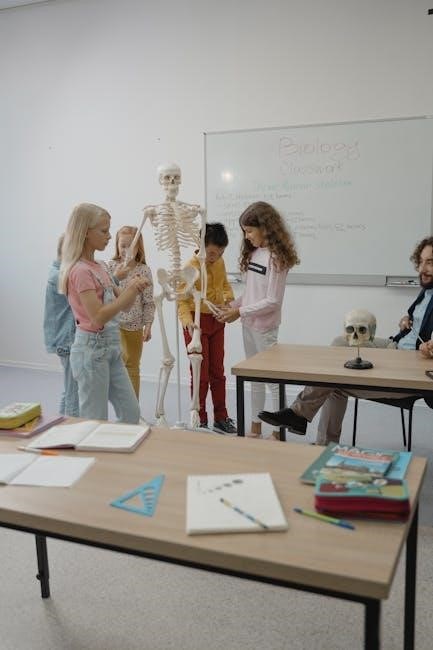The RCIA Curriculum is a comprehensive guide for the Rite of Christian Initiation of Adults, offering structured formation for those seeking to join the Catholic Church. Available as a PDF, it provides detailed teachings, liturgical practices, and spiritual guidance to facilitate a transformative journey of faith.
1.1. What is RCIA?
The Rite of Christian Initiation of Adults (RCIA) is a sacramental process for adults seeking to join the Catholic Church. It is a journey of faith formation, combining catechetical instruction, liturgical experience, and spiritual growth. The process is designed to help individuals understand Catholic teachings, develop a prayer life, and integrate into the Church community. RCIA is tailored to the needs of each person, offering a structured yet flexible path toward full initiation through the sacraments of Baptism, Confirmation, and the Eucharist. It is a transformative experience that fosters a deeper relationship with Christ and the Church.
1.2. Purpose of the RCIA Curriculum
The RCIA Curriculum is designed to guide adults in their faith journey toward full initiation into the Catholic Church. Its purpose is to provide a structured and holistic formation process, combining doctrinal instruction, liturgical participation, and spiritual growth. The curriculum aims to foster a deep understanding of Catholic teachings, nurture a personal relationship with Christ, and prepare individuals for the sacraments of Baptism, Confirmation, and the Eucharist. By integrating catechesis with prayer and community engagement, the RCIA Curriculum helps adults embrace their Catholic identity and actively participate in the life of the Church. It serves as a foundational resource for both catechists and participants.
1.3. Importance of the RCIA Process
The RCIA process is vital for fostering spiritual transformation and deepening faith among adults seeking to join the Catholic Church. It provides a structured journey of conversion, ensuring participants are well-prepared for the sacraments. By integrating doctrine, liturgy, and community, RCIA nurtures a lifelong commitment to Christ and the Church. It also serves as a powerful tool for evangelization, helping individuals encounter God and grow in discipleship. The process strengthens the parish community by welcoming new members and renewing the faith of existing ones. Ultimately, RCIA is a cornerstone of adult faith formation, guiding individuals toward a deeper understanding of Catholic teachings and a fuller participation in the life of the Church.

Structure of the RCIA Curriculum
The RCIA Curriculum is organized into key components, including doctrine, liturgical formation, and moral teachings, with phases like Inquiry, Catechumenate, Purification, and Mystagogia, ensuring a holistic faith journey.
2.1. Key Components of the Curriculum
The RCIA Curriculum includes essential teachings such as doctrine, liturgical practices, and moral formation. It emphasizes spiritual growth through phases like Inquiry, Catechumenate, Purification, and Mystagogia. Key resources include the RCIA Process Diagram, Program at a Glance, and Curriculum PDFs, which outline the structure and content. These materials ensure a comprehensive understanding of Catholic beliefs and practices. The curriculum also incorporates hands-on participation in liturgical rites and community engagement, fostering a deeper connection to the Church. Catechists play a vital role in delivering these components effectively, ensuring a transformative experience for participants. The curriculum is designed to be adaptable, catering to adult learners’ needs while maintaining fidelity to Catholic traditions and teachings.
2.2. Overview of the Formation Process

The RCIA formation process is a structured journey guiding adults toward full initiation into the Catholic Church. It begins with the Period of Inquiry, where individuals explore Catholic teachings. This leads to the Catechumenate, a deeper formation phase focusing on doctrine, liturgy, and spiritual growth. The process culminates in the Period of Purification and Enlightenment, preparing participants for the Sacraments of Initiation. Finally, Mystagogia follows, helping newly initiated members deepen their faith. The curriculum ensures a holistic approach, blending catechetical instruction, liturgical participation, and community engagement. Catechists and the parish community play pivotal roles in supporting this transformative journey, fostering a lifelong commitment to Catholic faith and practices.
2.3. Duration and Phases of the Program
The RCIA program typically spans approximately nine months, aligning with the liturgical year. It is divided into four distinct phases: the Period of Inquiry, the Catechumenate, the Period of Purification and Enlightenment, and Mystagogia. The Period of Inquiry is an introductory phase where participants explore Catholic teachings. The Catechumenate, the longest phase, focuses on deeper spiritual formation and catechetical instruction. The Period of Purification and Enlightenment coincides with Lent, preparing participants for the Sacraments of Initiation. Finally, Mystagogia follows Easter, helping new Catholics deepen their faith. The curriculum is designed to be flexible, ensuring a transformative journey tailored to adult learners’ needs and spiritual growth.

Key Teachings in the RCIA Curriculum
The RCIA curriculum emphasizes doctrine, liturgical formation, and moral teachings, guiding participants to a deeper understanding of Catholic beliefs and practices. It fosters spiritual growth and prepares adults for full sacramental life.
3.1. Doctrine and Catechetical Instruction
The RCIA curriculum emphasizes a systematic approach to teaching Catholic doctrine, ensuring a solid foundation in the faith. It covers key teachings such as the Creed, sacraments, and moral principles, rooted in Scripture and Tradition. Catechetical instruction is designed to engage participants intellectually and spiritually, fostering a deeper understanding of Catholic beliefs. The curriculum incorporates biblical studies, Church history, and the Catechism of the Catholic Church, providing a comprehensive framework for adult learners. Small group discussions, reflections, and personalized guidance are integral to this process, helping participants integrate doctrine into their daily lives and spiritual journeys.
3.2. Liturgical Formation and Participation
Liturgical formation is a cornerstone of the RCIA curriculum, helping participants deepen their understanding of Catholic worship and sacraments. The curriculum emphasizes active participation in the Mass, exploring its structure, symbols, and prayers. Candidates are introduced to key liturgical rites, such as the Rite of Election and the Scrutinies, which mark their journey toward initiation. Instruction focuses on the Eucharist as the “source and summit” of Christian life, fostering a sense of reverence and devotion. Practical engagement includes attending Mass, praying the Liturgy of the Hours, and reflecting on the liturgical year, enabling participants to integrate liturgical practices into their daily spiritual lives and communities.
3.3. Moral Formation and Spiritual Growth
Moral formation and spiritual growth are integral to the RCIA curriculum, guiding participants to embrace a Christ-centered life. The curriculum emphasizes the teachings of Jesus, the Ten Commandments, and the Beatitudes, fostering a moral framework rooted in Catholic doctrine. Spiritual growth is nurtured through prayer, reflection, and participation in sacraments, helping candidates develop a deeper relationship with God. Practical exercises, such as identifying suffering and finding new life, encourage participants to apply faith to real-life situations. The curriculum also highlights the importance of virtues and the role of the Holy Spirit in transforming lives, ensuring a holistic approach to moral and spiritual development.

The RCIA Process and Its Stages
The RCIA process includes distinct stages: Inquiry, Catechumenate, Purification and Enlightenment, and Mystagogia. These phases guide individuals through spiritual preparation, culminating in sacramental initiation into the Catholic Church.
4.1. The Period of Inquiry
The Period of Inquiry is the initial stage of the RCIA process, where individuals explore Catholicism and its teachings. It is a time for questions, reflection, and faith discovery, lasting several weeks. During this phase, participants engage in discussions about Catholic beliefs, practices, and traditions, guided by catechists and the RCIA curriculum. The goal is to foster a deeper understanding of the faith and help individuals discern their readiness to proceed. This period emphasizes spiritual exploration, prayer, and community connection, laying the foundation for further formation. Resources like the RCIA Curriculum PDF provide structured lessons and materials to support this journey of discovery and faith growth.
4.2. The Catechumenate
The Catechumenate is a prolonged period of formation in the RCIA process, focusing on deepening faith and understanding Catholic teachings. It follows the Period of Inquiry and lasts several months, with weekly sessions. During this phase, participants explore doctrine, prayer, and liturgical practices, guided by the RCIA curriculum. The Catechumenate emphasizes spiritual growth, community engagement, and moral development. Catechists use resources like the RCIA Curriculum PDF to provide structured lessons and reflections. This phase culminates in the Rite of Election, marking the transition to the next stage of preparation for the sacraments. The goal is to nurture a profound connection to Christ and the Church, preparing candidates for full initiation.
4.3. The Period of Purification and Enlightenment
The Period of Purification and Enlightenment is the final preparation phase before the sacraments of initiation. Typically occurring during Lent, this period focuses on spiritual cleansing, reflection, and deepening faith. Participants engage in prayer, fasting, and scrutiny rites to purify their hearts and minds. The curriculum emphasizes teachings on the sacraments, moral living, and the Paschal Mystery. This phase is crucial for enlightenment, helping candidates grasp the mysteries of the faith. The RCIA Process Diagram PDF outlines this stage, ensuring a structured approach. The goal is to prepare the elect for baptism, confirmation, and the Eucharist, fostering a profound encounter with Christ and the Church.
4.4. The Period of Mystagogia
The Period of Mystagogia is the final stage of the RCIA journey, occurring after the sacraments of initiation. It focuses on deepening the understanding of the mysteries of the faith and integrating the neophytes into the life of the Church. This phase emphasizes ongoing catechesis, prayer, and participation in parish life. The RCIA Curriculum PDF and Program at a Glance PDF provide resources for this period, ensuring a smooth transition into full Catholic life. Mystagogia encourages neophytes to reflect on their sacramental experiences and apply their faith in daily life, fostering lifelong spiritual growth and discipleship. This period bridges the sacramental initiation with active participation in the Church community.

Resources and Materials
The RCIA Curriculum PDF offers essential resources, including the RCIA Process Diagram, Program at a Glance, Curriculum, Registration Form, Mass Pamphlet, and additional handouts for comprehensive faith formation.
5.1. RCIA Process Diagram (PDF)
The RCIA Process Diagram (PDF) is a visual guide outlining the stages of the Rite of Christian Initiation of Adults. It provides a clear overview of the journey from the Period of Inquiry through Mystagogia. This diagram helps participants and facilitators understand the progression and milestones of the program. Available for download, it serves as a handy reference for tracking spiritual development and sacramental preparation. The diagram aligns with the curriculum, ensuring a cohesive and structured approach to faith formation.
5.2. Program at a Glance (PDF)
The Program at a Glance (PDF) offers a concise overview of the RCIA process, highlighting key components, timelines, and milestones. This document serves as a quick reference guide for participants, catechists, and RCIA teams, providing a clear understanding of the program’s structure. It outlines the duration, phases, and essential elements of the curriculum, ensuring everyone involved is aligned with the overall goals. The PDF is designed to be easily accessible and shared, making it a valuable tool for planning and preparation. It complements the full curriculum by offering a high-level perspective, helping to navigate the journey of faith formation effectively.
5.3. Curriculum (PDF)
The RCIA Curriculum (PDF) is a detailed document outlining the entire formation process for adults seeking to join the Catholic Church. It includes structured lesson plans, doctrinal teachings, and spiritual guidance tailored to facilitate a deep understanding of the faith. This comprehensive resource serves as a central guide for catechists and participants, ensuring a cohesive and transformative experience. The curriculum aligns with the liturgical year and incorporates moral and liturgical formation, preparing individuals for the sacraments of initiation. Available in PDF format, it is easily accessible and designed to support the pastoral, catechetical, and liturgical aspects of the RCIA journey, fostering a holistic approach to faith formation.
5.4. Registration Form (PDF)
The RCIA Registration Form (PDF) is a crucial document for initiating the process of adult initiation into the Catholic Church. It gathers essential personal and sacramental information about the candidate, such as baptismal status, marital situation, and previous religious education. This form helps the parish understand the candidate’s background and tailor the RCIA program to their specific needs. Available in PDF format, it is easily accessible and straightforward to complete, ensuring a smooth beginning to the faith journey. The registration form also serves as a formal declaration of the candidate’s intent to pursue full initiation into the Catholic Church.
5.5. Mass Pamphlet (PDF)
The RCIA Mass Pamphlet (PDF) is a helpful resource designed to guide participants through the liturgical celebration of the Mass. It provides a clear outline of the Mass structure, including the Liturgy of the Word, the Liturgy of the Eucharist, and the Concluding Rites. This pamphlet is particularly useful for those new to the Catholic faith, offering explanations of key prayers, gestures, and rituals. Available in PDF format, it is easily accessible and serves as a valuable reference for understanding and participating fully in the Mass. The pamphlet is often distributed to RCIA candidates and sponsors to enhance their liturgical formation and deepen their spiritual engagement.

Implementation of the RCIA Curriculum
The RCIA curriculum is implemented through a structured process involving catechists, sponsors, and parish teams. Effective strategies engage adult learners, fostering spiritual growth and understanding of Catholic teachings. Best practices include personalized formation, liturgical participation, and community support, ensuring a holistic approach to faith journey. Resources like the RCIA Catechist Manual provide guidance for a nine-month formation process, emphasizing pastoral, liturgical, and catechetical aspects. This comprehensive approach ensures candidates receive a transformative experience, preparing them for full sacramental life in the Church. Regular assessments and feedback loops further enhance the implementation process, ensuring adaptability to individual and communal needs. This collaborative effort creates a nurturing environment for spiritual development and integration into the Catholic community. By focusing on both doctrine and practice, the RCIA curriculum implementation equips participants with the knowledge and faith necessary for a lifelong commitment to Christianity. The process is tailored to meet the unique needs of adult learners, recognizing their diverse backgrounds and experiences. Through active participation in liturgies, discussions, and reflections, participants deepen their understanding of the Catholic faith. The implementation phase also includes practical tools and resources, such as the RCIA Process Diagram and Program at a Glance, which provide clear guidance for both facilitators and participants. These materials ensure consistency and coherence in the formation process, helping to build a strong foundation for the spiritual journey ahead. Overall, the implementation of the RCIA curriculum is a well-organized and compassionate approach to initiating adults into the Catholic Church, emphasizing both intellectual and spiritual growth. This structured yet flexible methodology ensures that each participant’s journey is both meaningful and enriching, leading to a deeper connection with the Church and its teachings. By integrating various aspects of faith formation, the RCIA curriculum implementation serves as a vital tool for fostering lifelong discipleship and active participation in the Catholic community. The collaborative efforts of catechists, sponsors, and parish teams are essential in creating a supportive and inclusive environment that nurtures faith and understanding. Through this comprehensive implementation process, the RCIA curriculum effectively guides adults toward full initiation into the Catholic Church, empowering them to live out their faith with confidence and joy. The resources and strategies employed in this phase are designed to address the unique challenges and opportunities of adult faith formation, ensuring a transformative and lasting experience for all participants. The implementation of the RCIA curriculum is a testament to the Church’s commitment to providing a robust and compassionate program for those seeking to deepen their relationship with Christ and the Catholic community. By focusing on both the head and the heart, the RCIA curriculum implementation ensures that participants are well-equipped to embrace their faith and live it out in their daily lives. This holistic approach to faith formation is at the core of the RCIA process, making it a powerful tool for evangelization and discipleship in the modern world. The implementation phase also emphasizes the importance of community and belonging, helping participants feel connected to the larger Catholic family. Through this sense of connection, participants are supported and encouraged as they navigate their faith journey, ultimately leading to a more vibrant and engaged Catholic community. The RCIA curriculum implementation is a vital component of the Church’s mission to spread the Gospel and bring people closer to Christ, ensuring that the next generation of Catholics is well-formed and committed to their faith. By providing a clear and structured path to initiation, the RCIA process empowers adults to embrace their faith with confidence and enthusiasm, contributing to the ongoing life and mission of the Church. The implementation of the RCIA curriculum is a shining example of the Church’s dedication to the spiritual growth and development of all its members, offering a comprehensive and compassionate approach to faith formation. This process not only transforms individuals but also strengthens the Church as a whole, fostering a community of believers who are deeply rooted in their faith and committed to living it out in the world. The RCIA curriculum implementation is a powerful expression of the Church’s commitment to the New Evangelization, providing a robust and engaging program for those seeking to deepen their relationship with Christ and the Catholic Church. By focusing on the unique needs of adult learners, the RCIA process ensures that each participant’s journey is both meaningful and transformative, leading to a lifelong commitment to the faith. The implementation phase is a critical part of this journey, offering practical support and guidance as participants prepare to receive the sacraments of initiation. Through this structured and compassionate approach, the RCIA curriculum implementation helps participants navigate the challenges of faith formation, ultimately leading to a deeper understanding and love for the Catholic faith. The RCIA process is a beautiful expression of the Church’s mission to bring people to Christ, and its implementation is a testament to the power of faith formation in transforming lives and building a vibrant Catholic community. By providing a clear and structured path to initiation, the RCIA curriculum implementation empowers adults to embrace their faith with confidence and enthusiasm, contributing to the ongoing life and mission of the Church. The implementation phase is a critical part of this journey, offering practical support and guidance as participants prepare to receive the sacraments of initiation. Through this structured and compassionate approach, the RCIA curriculum implementation helps participants navigate the challenges of faith formation, ultimately leading to a deeper understanding and love for the Catholic faith. The RCIA process is a beautiful expression of the Church’s mission to bring people to Christ, and its implementation is a testament to the power of faith formation in transforming lives and building a vibrant Catholic community. By providing a clear and structured path to initiation, the RCIA curriculum implementation empowers adults to embrace their faith with confidence and enthusiasm, contributing to the ongoing life and mission of the Church. The implementation phase is a critical part of this journey, offering practical support and guidance as participants prepare to receive the sacraments of initiation. Through this structured and compassionate approach, the RCIA curriculum implementation helps participants navigate the challenges of faith formation, ultimately leading to a deeper understanding and love for the Catholic faith. The RCIA process is a beautiful expression of the Church’s mission to bring people to Christ, and its implementation is a testament to the power of faith formation in transforming lives and building a vibrant Catholic community. By providing a clear and structured path to initiation, the RCIA curriculum implementation empowers adults to embrace their faith with confidence and enthusiasm, contributing to the ongoing life and mission of the Church. The implementation phase is a critical part of this journey, offering practical support and guidance as participants prepare to receive the sacraments of initiation. Through this structured and compassionate approach, the RCIA curriculum implementation helps participants navigate the challenges of faith formation, ultimately leading to a deeper understanding and love for the Catholic faith. The RCIA process is a beautiful expression of the Church’s mission to bring people to Christ, and its implementation is a testament to the power of faith formation in transforming lives and building a vibrant Catholic community. By providing a clear and structured path to initiation, the RCIA curriculum implementation empowers adults to embrace their faith with confidence and enthusiasm, contributing to the ongoing life and mission of the Church. The implementation phase is a critical part of this journey, offering practical support and guidance as participants prepare to receive the sacraments of initiation; Through this structured and compassionate approach, the RCIA curriculum implementation helps participants navigate the challenges of faith formation, ultimately leading to a deeper understanding and love for the Catholic faith. The RCIA process is a beautiful expression of the Church’s mission to bring people to Christ, and its implementation is a testament to the power of faith formation in transforming lives and building a vibrant Catholic community. By providing a clear and structured path to initiation, the RCIA curriculum implementation empowers adults to embrace their faith with confidence and enthusiasm, contributing to the ongoing life and mission of the Church. The implementation phase is a critical part of this journey, offering practical support and guidance as participants prepare to receive the sacraments of initiation. Through this structured and compassionate approach, the RCIA curriculum implementation helps participants navigate the challenges of faith formation, ultimately leading to a deeper understanding and love for the Catholic faith. The RCIA process is a beautiful expression of the Church’s mission to bring people to Christ, and its implementation is a testament to the power of faith formation in transforming lives and building a vibrant Catholic community. By providing a clear and structured path to initiation, the RCIA curriculum implementation empowers adults to embrace their faith with confidence and enthusiasm, contributing to the ongoing life and mission of the Church. The implementation phase is a critical part of this journey, offering practical support and guidance as participants prepare to receive
6.1; Role of the Catechist
The catechist plays a central role in the RCIA process, serving as a spiritual guide and educator. They facilitate sessions, provide doctrinal instruction, and help participants connect faith with life. Catechists ensure the curriculum is taught in a way that engages adult learners, fostering both intellectual understanding and spiritual growth. They also act as mentors, offering support and answering questions to aid participants in their journey. The catechist’s role is both pastoral and instructional, requiring a balance of teaching, listening, and guiding. Effective catechists create a welcoming environment, encouraging participation and reflection. Their dedication is crucial in helping participants deepen their faith and prepare for sacramental initiation. The catechist’s role is essential in making the RCIA process transformative and meaningful.
6.2. Engaging Adult Learners
Engaging adult learners in the RCIA process requires a dynamic and interactive approach. Catechists should create a welcoming environment that fosters dialogue and reflection. Using the RCIA curriculum as a guide, sessions should incorporate real-life applications of faith, making teachings relevant and relatable. Adults respond well to discussions that connect doctrine to personal experiences, allowing them to integrate faith into their daily lives. Incorporating multimedia resources, such as videos or handouts, can also enhance learning. Encouraging participation through small group discussions or reflective exercises helps deepen understanding. Catechists should be attentive to the diverse backgrounds and needs of participants, tailoring their approach to ensure engagement and spiritual growth; Active involvement is key to helping adults embrace their faith journey meaningfully.
6.3. Best Practices for RCIA Teams
Effective RCIA teams thrive on collaboration and shared responsibility. Catechists, sponsors, and support members should work together to create a nurturing environment for spiritual growth. Regular team meetings ensure alignment and address participant needs. Encouraging open dialogue and faith-sharing among team members fosters a unified approach. Providing ongoing formation for the team enhances their ability to guide participants. Prayer and reflection should be integral to team activities, grounding efforts in a spiritual foundation. Teams should also seek feedback from participants to refine their methods. By prioritizing these practices, RCIA teams can effectively support the journey of adults seeking to join the Catholic Church, ensuring a transformative and meaningful experience.
The RCIA curriculum offers a transformative spiritual journey, guiding adults into the Catholic Church through doctrine, liturgy, and community. It fosters faith formation and sacramental initiation effectively.
7.1; Summary of Key Points
The RCIA curriculum is a structured program guiding adults through Catholic teachings, liturgical practices, and spiritual growth. It includes key resources like the RCIA Process Diagram, Program at a Glance, and Curriculum PDF, which outline the formation process. The curriculum emphasizes doctrine, moral formation, and liturgical participation, ensuring a holistic approach to faith. It also covers the four stages of the RCIA journey: Inquiry, Catechumenate, Purification and Enlightenment, and Mystagogia. These phases foster community engagement, prayer, and reflection, preparing individuals for sacramental initiation. The curriculum’s design ensures a transformative experience, equipping participants with the knowledge and spirituality needed for a lifelong commitment to Catholic faith and practices.
7.2. The Transformative Power of the RCIA Process
The RCIA process is more than an educational program; it is a spiritual journey of conversion and discipleship. It transforms lives by deepening faith, fostering a personal relationship with Christ, and integrating individuals into the Catholic community. Through doctrine, liturgy, and moral formation, participants gain a profound understanding of Catholic teachings. The process nurtures spiritual growth, encouraging prayer, reflection, and service. Many find the RCIA journey life-changing, as it equips them to live out their faith authentically. The transformative power of RCIA lies in its ability to inspire hearts, minds, and souls, leading to a lifelong commitment to Catholicism and active participation in the Church.

